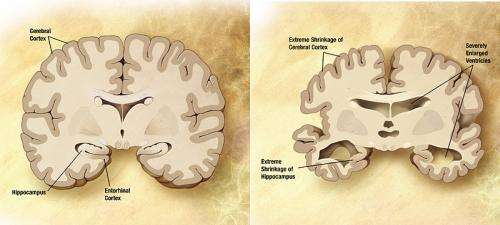Study adds to emerging theme about the immune system's involvement in Alzheimer's disease

The role of the immune system in Alzheimer's disease is a hot topic, but exactly how the two are connected and what interventions could help lower risk remain a mystery. In a new study published in Nature Neuroscience this week, researchers in the Ann Romney Center for Neurologic Diseases at Brigham and Women's Hospital (BWH) investigate how genetic risk factors for Alzheimer's disease may influence a key type of immune cell. Their results lay the groundwork for designing better therapeutic strategies and better prediction tools for risk of developing Alzheimer's disease.
"There's an emerging theme in Alzheimer's genetics that the immune system may be strongly involved in the onset of Alzheimer's disease," said co-corresponding author Philip De Jager, MD, PhD, who directs the Program in Translational NeuroPsychiatric Genomics at the Ann Romney Center for Neurologic Diseases at BWH. "Before genetic studies, many thought that inflammation was a symptom of or a reaction to the disease, but our study and others build a compelling case that the immune system may be involved in the development of Alzheimer's disease."
De Jager and his team examined the levels of key proteins in relation to genetic variants that have been implicated in Alzheimer's disease in the past. The team looked at blood samples from more than 100 younger, healthy subjects as well as 61 older subjects and measured protein levels in monocytes - immune cells that can travel to various sites throughout the body, including the brain where they differentiate into macrophages, specialized for their new environment, in this case the central nervous system.
One of the most intriguing results the team uncovered is connected to TREM2 - a protein that is a major target of Alzheimer's disease drug development efforts. A previous study of a population in Iceland found that a rare mutation in the gene encoding TREM2 substantially elevated a person's risk of Alzheimer's disease. However, it was unclear whether more TREM2 or less TREM2 led to this heightened risk, and follow-up studies in mice have produced conflicting results.
De Jager and his colleagues found evidence that directly addresses this question, determining that higher levels of TREM2 were associated with increased risk. The team found that a genetic variant tied to a separate protein, CD33, also influenced TREM2 levels. The team's follow-up studies confirmed that the genetic variant led to more CD33, which in turn led to more TREM2. "One interesting note about these protein associations is that we did not observe them at the mRNA level," said first author Gail Chan, PhD, a research fellow in the Ann Romney Center for Neurologic Diseases at BWH. "This emphasizes the amount of inter-regulation that a cell does to balance all of the related molecules in order to function correctly."
"Up until now, it's been unclear whether it would be beneficial to increase or decrease TREM2 levels," said co-corresponding author Elizabeth Bradshaw, PhD, of the Ann Romney Center for Neurologic Diseases at BWH. "Further studies are needed to understand the connections we're uncovering and the roles of these proteins, but we're clearly seeing evidence that these genetic variants have an effect in this type of immune cell."
As a next step, Bradshaw, De Jager and their colleagues plan to measure CD33 and TREM2 levels in subjects as part of the Brigham Healthy Aging Project to determine if these measurements and others could be part of a diagnostic panel for predicting risk of Alzheimer's disease.
More information: CD33 modulates TREM2: convergence of Alzheimer loci, Nature Neuroscience, DOI: 10.1038/nn.4126


















